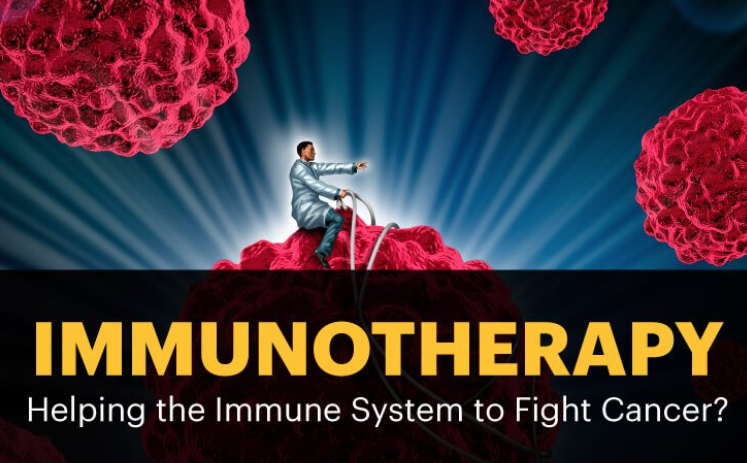WHAT IS IMMUNOTHERAPY?

 BY KATIE LUQUIRE – Immunotherapy is a buzzword that is sweeping the nation with the hope of improving outlook for those with cancer. But what does immunotherapy actually mean? The immune system, the target of immunotherapy, is the body’s natural method of disease prevention. The adaptive immune system contains highly specific cells that accurately detect and eliminate pathogens. However, while powerful enough to ward off most bacteria and viruses, the the immune system doesn’t always recognize cancer cells as foreign. In general, immunotherapy is used to direct the specialized cells of the immune system to react more strongly to tumor growth, or to mark cancer cells to be destroyed by the immune system. Immunotherapy is currently being used for many types of cancers, some of which include lymphoma, melanoma, and lung cancer. While many immunotherapy drugs have been created, much of the research on immunotherapy is still underway.
BY KATIE LUQUIRE – Immunotherapy is a buzzword that is sweeping the nation with the hope of improving outlook for those with cancer. But what does immunotherapy actually mean? The immune system, the target of immunotherapy, is the body’s natural method of disease prevention. The adaptive immune system contains highly specific cells that accurately detect and eliminate pathogens. However, while powerful enough to ward off most bacteria and viruses, the the immune system doesn’t always recognize cancer cells as foreign. In general, immunotherapy is used to direct the specialized cells of the immune system to react more strongly to tumor growth, or to mark cancer cells to be destroyed by the immune system. Immunotherapy is currently being used for many types of cancers, some of which include lymphoma, melanoma, and lung cancer. While many immunotherapy drugs have been created, much of the research on immunotherapy is still underway.
The University of Georgia, Emory University, and Augusta University are just a few of the institutions that are working to find new immunotherapy treatments. In January 2019, researchers at the Winship Cancer Institute at Emory University created a system that can test whether certain compounds can enhance the body’s ability to suppress cancer growth. This system, called HTiP, was used to find that an immunotherapy drug, birinapant, mitigates the immunosuppressive effects caused by the KRAS mutation found in lung and colorectal cancers. While the KRAS mutation suppresses immune function and leads to treatment resistance, birinapant negates the negative effects of the mutation to increase tumor cell death. Other treatments, such as cancer vaccines, are also being evaluated for their potential role in decreasing the burden of cancer worldwide.
Currently, vaccines are not a major type of treatment for cancer, but researchers around the globe, and even right here in Georgia, are currently working to develop vaccines for cancer treatment. The Georgia Cancer Center at Augusta University is currently working to develop peptide-based vaccines for enhancing T-cells, one form of specialized cell that the immune system uses to target pathogens. Additionally, in 2016 a research team from Emory University and Metaclipse Therapeutic Corp. received a five-year $2.4 million grant from the NIH to develop a breast cancer vaccine. Currently, only one cancer vaccine, Sipuleucel-T, has been approved by the FDA and is currently used to treat advanced prostate cancer. Clinical trials for other types of cancer vaccines have been successful, but it will take some time before they are approved for use.
Despite its benefits, immunotherapy treatment faces challenges due to individual responses, potential resistance, and cost. Immunotherapy results vary as a result of differences in the underlying biology of the disease. Therefore, it can be highly effective for some patients and relatively ineffective for others depending on the individual’s immune system, biomarkers, cancer stage and type, and treatment history. Additionally, cancel signalling networks are highly adaptive, which can cause resistance to certain treatments. While this is also a problem for other treatment methods, such as chemotherapy, it is worth considering. Immunotherapy treatment is also increasingly expensive, which can place a burden on patient finances and the health care system overall. Before using immunotherapy, healthcare providers should screen patients for biomarkers to determine if they will respond to the treatment and evaluate if there will be a significant clinical benefit.
While immunotherapy is currently playing a small role in the fight against cancer, the number of researchers who are dedicated to finding new solutions in immunotherapy is booming. It will not be long before we see some of these drugs come to the market, which could have a massive impact on how cancer is treated and drastically improve outcomes for some cancer patients. For patients whose cancer has been resistant to radiation and chemotherapy, immunotherapy could fill a gap that could save many patients’ lives. It is especially exciting to see all of this play out in our own state.
